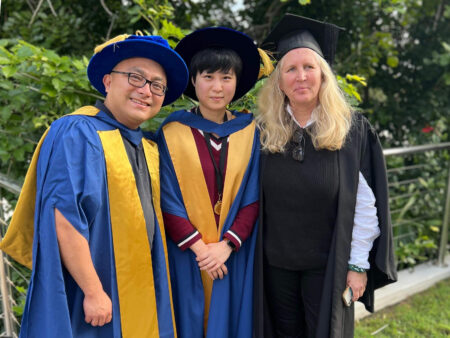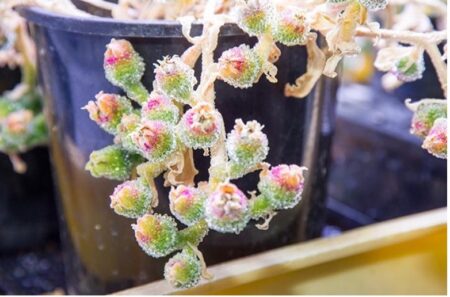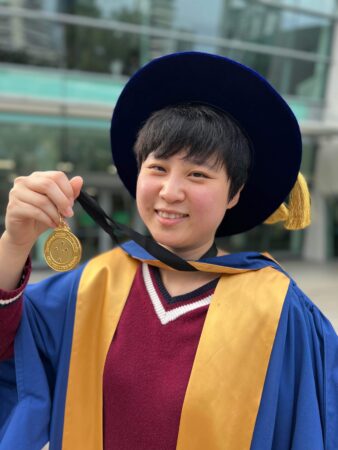 In good news for global agriculture, PhD research by Southern Cross University’s Dr. Qi Guo has identified changes in membrane lipids in salt-tolerant plants as an important salinity tolerance mechanism.
In good news for global agriculture, PhD research by Southern Cross University’s Dr. Qi Guo has identified changes in membrane lipids in salt-tolerant plants as an important salinity tolerance mechanism.
Soil salinisation is recognised as a serious environmental threat and limits agriculture in many countries across the globe – issues expected to be further exacerbated by projected climatic change.
Dr. Guo’s PhD project ‘Membrane remodelling in plant salt tolerance’ undertaken on a Southern Cross University Higher Degree Research Scholarship with the Faculty of Science and Engineering will inform future work by plant breeders to engineer salt-tolerant crops.
Significant tracts of salinised areas can be found in India, China, the United States, Pakistan, and many regions throughout Australia are also at high risk of increasing salinization.
According to Dr. Guo, salt-tolerant crop breeding will have global benefit as it has the potential to help increase crop production and improve soil health.
Dr. Guo’s PhD discovery involved painstaking work, analysing tissue specimens of the ice plant measuring just a thousand-millionth of a metre.
Her research capitalised on the use of innovative membrane isolation technology called Free-Flow Electrophoresis, along with next-generation proteomic technology SWATH-MS, and mass spectrometry-based lipidomic analyses.
“These approaches were deployed to investigate changes in proteins and lipids in leaf tissue of the halophyte ice plant (Mesembryanthemum crystallinum) grown under salt conditions,” said Dr. Guo.

Results of her PhD research provided a framework to develop a model for salinity-induced membrane remodelling at the subcellular membrane level. “This information could help inform future work engineering salt-tolerant crops,” according to Dr. Guo.
The subcellular lipidome and proteome are rarely studied, mainly due to the high level of complexity of the total cellular sample, and lack of optimal fractionation techniques.
“This research adopted a new approach and sets a precedent for reducing membrane sample complexity and provided deeper insight into the molecular mechanisms of plant abiotic stress tolerance,” said Dr Guo.
The significance of Dr. Guo’s PhD certainly attracted the attention of her examiners, so much so that she was awarded this year’s Chancellor’s Medal, Southern Cross University’s highest accolade for an outstanding thesis.
 “
“
I feel great about receiving the Chancellor’s Medal. It’s the best acknowledgment for all the hard work I put in during my PhD,” said Dr Guo.
Dr. Guo’s research findings have been published in high-impact journals including Plant Physiology, International Journal of Molecular Sciences, International Journal of Molecular Sciences.
She has found the publishing process to be an integral part of the research journey. “It helps me to clarify my goals for the research, prompts me to review and interpret my own data and to compare with that of others.”
“Besides, peer review gives critical feedback and helps improve the significance of my work. It is also a means of sharing my work with a larger audience,” said Dr. Guo.
Dr. Guo’s PhD journey was greatly assisted by the encouragement, help and support she received from her supervision team, Professor Bronwyn Barkla and Dr. Lei (Ben) Liu.
“It was very rewarding working with supervisors and colleagues who motivated and challenged me, they helped me learn and grow,” said Dr. Guo.
The development of her problem-solving skills was another highly rewarding component of the PhD journey. “This has made me less afraid of failure and more willing to accept challenges,” she said.
As to some of the challenging aspects, Dr. Guo cites self-motivation as a reoccurring test. “There were many times I found the pressure of a bad experiment or a lack of ideas in my writing were discouraging.”
In those circumstances, a change of tact coupled with a positive mindset helped no end, “Usually, when that happened, I would try to complete some easy tasks first, which gave me more confidence to complete more difficult tasks.”
“Doing a PhD doesn’t necessarily change your life, but it could possibly change your perspective on it. It is a good way to make you understand that hard work pays off!” said Dr. Guo.
Dr. Guo hopes to continue to follow her passion and develop her research career, “I hope to be able to gain more knowledge about plant-environment interactions through multi-omics techniques, especially under the current conditions of drastic climate changes.”
Read more about Dr. Qi Guo’s research by visiting her ORCID, Google Scholar or ResearchGate profiles.
Images: Dr. Qi Guo with supervisors Dr. Lei (Ben) Liu (left) and Professor Bronwyn Barkla (right); Ice plant (Mesembryanthemum crystallinum) used in the study; Dr. Qi Guo with the 2022 Southern Cross University Chancellor’s Medal.

Leave a comment